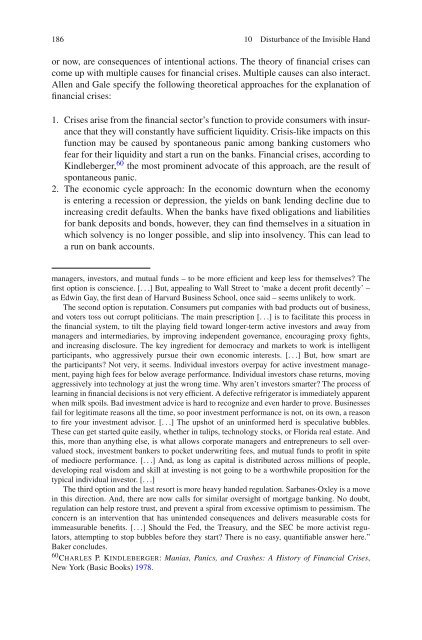The Ethics of Banking: Conclusions from the Financial Crisis (Issues ...
The Ethics of Banking: Conclusions from the Financial Crisis (Issues ...
The Ethics of Banking: Conclusions from the Financial Crisis (Issues ...
You also want an ePaper? Increase the reach of your titles
YUMPU automatically turns print PDFs into web optimized ePapers that Google loves.
186 10 Disturbance <strong>of</strong> <strong>the</strong> Invisible Hand<br />
or now, are consequences <strong>of</strong> intentional actions. <strong>The</strong> <strong>the</strong>ory <strong>of</strong> financial crises can<br />
come up with multiple causes for financial crises. Multiple causes can also interact.<br />
Allen and Gale specify <strong>the</strong> following <strong>the</strong>oretical approaches for <strong>the</strong> explanation <strong>of</strong><br />
financial crises:<br />
1. Crises arise <strong>from</strong> <strong>the</strong> financial sector’s function to provide consumers with insurance<br />
that <strong>the</strong>y will constantly have sufficient liquidity. <strong>Crisis</strong>-like impacts on this<br />
function may be caused by spontaneous panic among banking customers who<br />
fear for <strong>the</strong>ir liquidity and start a run on <strong>the</strong> banks. <strong>Financial</strong> crises, according to<br />
Kindleberger, 60 <strong>the</strong> most prominent advocate <strong>of</strong> this approach, are <strong>the</strong> result <strong>of</strong><br />
spontaneous panic.<br />
2. <strong>The</strong> economic cycle approach: In <strong>the</strong> economic downturn when <strong>the</strong> economy<br />
is entering a recession or depression, <strong>the</strong> yields on bank lending decline due to<br />
increasing credit defaults. When <strong>the</strong> banks have fixed obligations and liabilities<br />
for bank deposits and bonds, however, <strong>the</strong>y can find <strong>the</strong>mselves in a situation in<br />
which solvency is no longer possible, and slip into insolvency. This can lead to<br />
a run on bank accounts.<br />
managers, investors, and mutual funds – to be more efficient and keep less for <strong>the</strong>mselves? <strong>The</strong><br />
first option is conscience. [...] But, appealing to Wall Street to ‘make a decent pr<strong>of</strong>it decently’ –<br />
as Edwin Gay, <strong>the</strong> first dean <strong>of</strong> Harvard Business School, once said – seems unlikely to work.<br />
<strong>The</strong> second option is reputation. Consumers put companies with bad products out <strong>of</strong> business,<br />
and voters toss out corrupt politicians. <strong>The</strong> main prescription [...] is to facilitate this process in<br />
<strong>the</strong> financial system, to tilt <strong>the</strong> playing field toward longer-term active investors and away <strong>from</strong><br />
managers and intermediaries, by improving independent governance, encouraging proxy fights,<br />
and increasing disclosure. <strong>The</strong> key ingredient for democracy and markets to work is intelligent<br />
participants, who aggressively pursue <strong>the</strong>ir own economic interests. [...] But, how smart are<br />
<strong>the</strong> participants? Not very, it seems. Individual investors overpay for active investment management,<br />
paying high fees for below average performance. Individual investors chase returns, moving<br />
aggressively into technology at just <strong>the</strong> wrong time. Why aren’t investors smarter? <strong>The</strong> process <strong>of</strong><br />
learning in financial decisions is not very efficient. A defective refrigerator is immediately apparent<br />
when milk spoils. Bad investment advice is hard to recognize and even harder to prove. Businesses<br />
fail for legitimate reasons all <strong>the</strong> time, so poor investment performance is not, on its own, a reason<br />
to fire your investment advisor. [...] <strong>The</strong> upshot <strong>of</strong> an uninformed herd is speculative bubbles.<br />
<strong>The</strong>se can get started quite easily, whe<strong>the</strong>r in tulips, technology stocks, or Florida real estate. And<br />
this, more than anything else, is what allows corporate managers and entrepreneurs to sell overvalued<br />
stock, investment bankers to pocket underwriting fees, and mutual funds to pr<strong>of</strong>it in spite<br />
<strong>of</strong> mediocre performance. [...] And, as long as capital is distributed across millions <strong>of</strong> people,<br />
developing real wisdom and skill at investing is not going to be a worthwhile proposition for <strong>the</strong><br />
typical individual investor. [...]<br />
<strong>The</strong> third option and <strong>the</strong> last resort is more heavy handed regulation. Sarbanes-Oxley is a move<br />
in this direction. And, <strong>the</strong>re are now calls for similar oversight <strong>of</strong> mortgage banking. No doubt,<br />
regulation can help restore trust, and prevent a spiral <strong>from</strong> excessive optimism to pessimism. <strong>The</strong><br />
concern is an intervention that has unintended consequences and delivers measurable costs for<br />
immeasurable benefits. [...] Should <strong>the</strong> Fed, <strong>the</strong> Treasury, and <strong>the</strong> SEC be more activist regulators,<br />
attempting to stop bubbles before <strong>the</strong>y start? <strong>The</strong>re is no easy, quantifiable answer here.”<br />
Baker concludes.<br />
60 CHARLES P. KINDLEBERGER: Manias, Panics, and Crashes: A History <strong>of</strong> <strong>Financial</strong> Crises,<br />
New York (Basic Books) 1978.

















